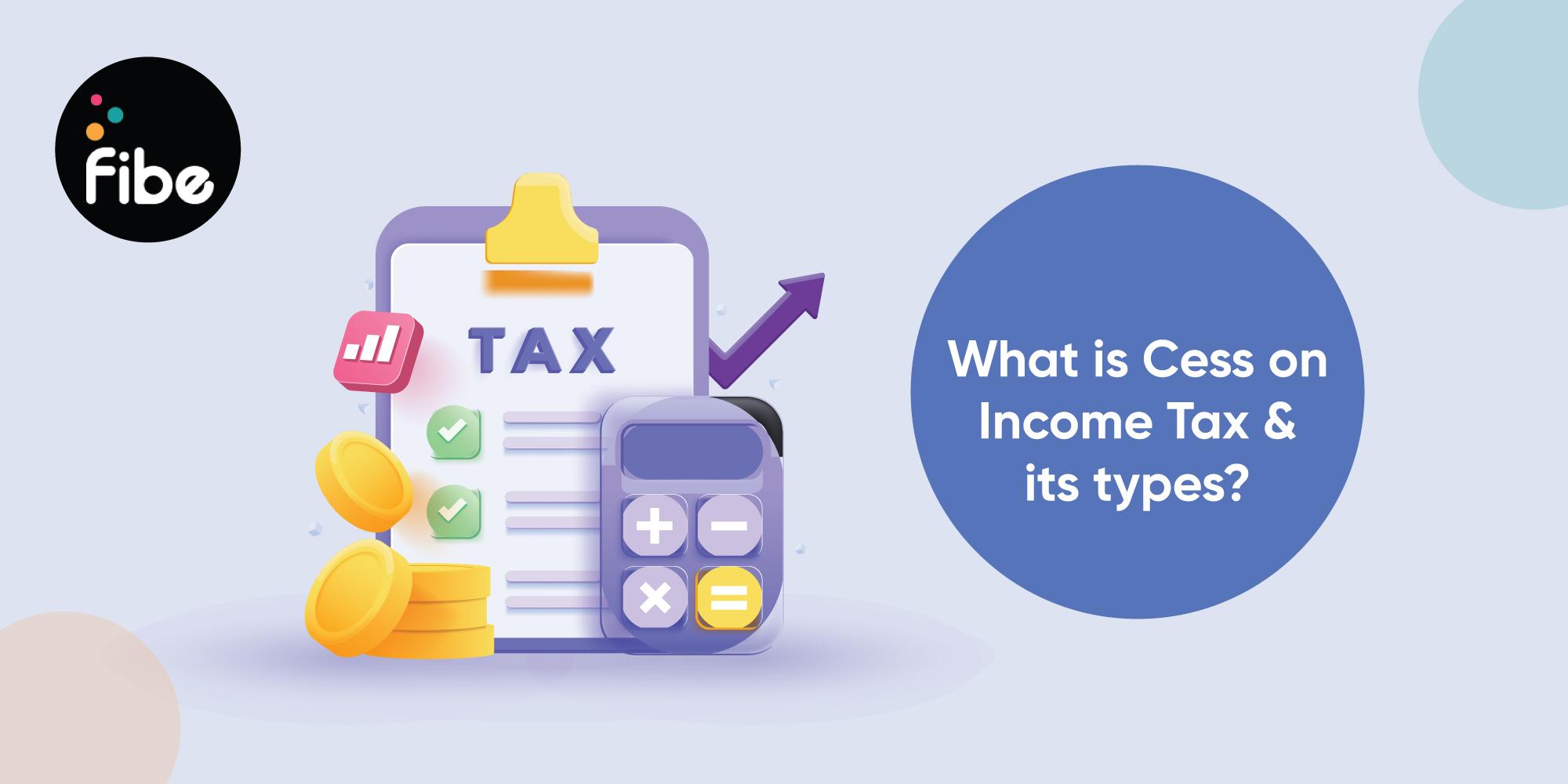Cess on Income Tax Explained: Types, Filing & Calculation
Reviewed by: Fibe Research Team
- Updated on: 15 May 2025
Reviewed by: Fibe Research Team

The Central Government in India collects CESS on income tax to fund specific programs or purposes. This additional tax is not permanent like general taxes and is discontinued once the required funds have been raised.
Read on to learn what CESS on Income Tax is, its types, how it is different from general taxes, income tax CESS calculation and more.
CESS tax full form is Central Excise and Service Tax. It is a variant of tax that the Central Government levies on your basic tax (income tax) liability to raise funds for specific public expenditures. However, like other taxes, the government deposits CESS on income tax in the Consolidated Fund of India (CFI). They allocate it only for the specific purpose for which it was collected.
This tax is not like other taxes levied by the government as it helps collect funds for a specific developmental goal. Once the goal is reached, the government discontinues this tax. At the same time, you have to continue paying the other taxes.
Another key difference is that the government can use other taxes for any cause for the development of the nation. They can decide how to use the collected tax by allocating funds to any department as per the budget. With CESS, the usage of the funds is fixed before collection, and they cannot be used for any other purpose.
This tax is imposed when a particular sector needs additional funding. For example, when the education and health sector is getting insufficient funding from the regular budget, or the educational ministry wants to introduce a new scheme. Through CESS, the government can arrange the funds with ease.
To understand the calculation of CESS better, check the example provided below:
Suppose Mr. X has an annual income of ₹20 lakhs with a tax liability of ₹4 lakhs. If the education CESS levied by the government is 4%, his CESS tax liability would be as follows-
Education CESS on Income Tax = CESS Rate X Total Tax Liability = 4/100 X ₹4,00,000 = ₹16,000.
Also Read: What is Income Tax Return?
The government levies different types of CESS on income tax to raise funds for various public welfare schemes. These include:
It is a type of cess that was introduced in the Union Budget 2018. The government levies this tax to raise funds for the health and education needs of individuals belonging to the Below Poverty Line (BPL) segment.
For the development of the domestic oil and natural gas blocks, the government levies an ad valorem cess.
The Central Government also charges a road and infrastructure cess on specific excisable and imported goods transported through four-wheelers and heavy-transport vehicles. As per the latest government notification, the cess is ₹1 per litre of high-speed diesel and petrol.
To run welfare schemes targeting construction workers, the government raises funds through the Building and Other Construction Workers’ Welfare (BOCWW) Cess Act, 1996. Under this act, an employer needs to pay 1% of the construction cost as BOCWW cess.
The Central Government also imposes a National Calamity Contingent Duty (NCCD) on cigarettes, chewing tobacco and pan masala. The government has increased the rate of NCCD cess to 16% on specific cigarette brands in the Union Budget 2023.
The Central Government levies a GST Compensation Cess on goods of demerit and luxurious categories. This cess subsumed the clean energy cess in tax.
Also Read: Direct Tax Vs Indirect Tax
All the types of cesses attract different rates of taxes. Here is a table to give you a complete picture of how much each rate of cess on income tax increases your liability.
Here are some other types of cesses on Income Tax that the Government of India levies:
The Central Government levied this cess on all taxable services in 2015 to raise funds for the cleanliness funds. The Swachh Bharat Cess rate is 0.5%.
The Government of India introduced this cess on income tax in 2016 for the development of agricultural activities in India. It is applicable as service tax at the rate of 0.5% on the on-paper price of every service.
Taxes can sometimes be a burden on your income and may leave you short-handed at the end of the month. Thankfully, you can rely on the Fibe instant Personal Loan to address such shortfalls without any stress.
You can get up to ₹5 lakhs at affordable rates with simple documentation and eligibility requirements. Download the Fibe Personal Loan App or register on the website for a quick and easy application process!
The Central Government levies an education cess at the rate of 4% on income tax.
Every taxpayer liable to pay income tax needs to pay cess on income tax.
The cess in tax remains the same for all income brackets, which means that cess rates will remain the same if your income exceeds ₹50 lakhs.
Every taxpayer earning taxable income is eligible for cess at the rate decided by the government.